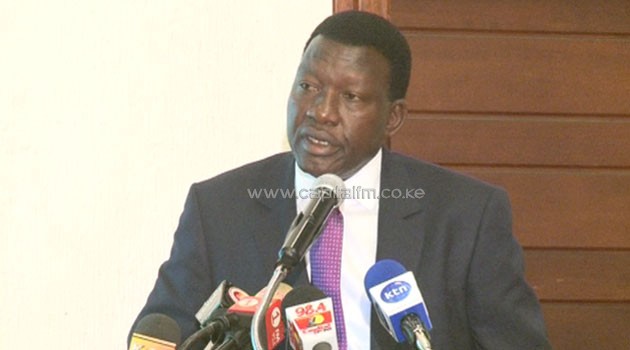
The cost of power this month has reduced by 52 percent owing to increased generation of geothermal power from the Olkaria power plant.
NAIROBI, Kenya, Nov 4 – Energy Cabinet Secretary Davis Chirchir has allayed scepticism and affirmed the cost of power this month has reduced by 52 percent owing to increased generation of geothermal power from the Olkaria power plant.
Speaking to journalists in his office on Friday, the Cabinet Secretary pointed out that this represents a fuel charge reduction from 7.22 US cents in August to 3.47 cents in the month of November.
Chirchir however observed that some people may not be able to feel the impact of the reduced charges as the amount of power they consume per month varies and as a result, they are charged with different tariffs.
“We will get customers who will say that my bill has not gone down but the question that you need to answer immediately is if you check your bill for the current month with that of the previous months, are you dealing with the same units? You know if you have been doing a lot of work needing electricity, the units will go up and therefore your bill will also go up since you are subjecting this small unit to a very large consumption,” he said.
His sentiments come amid complaints that the cost of electricity is still high despite reassurances that it would be lowered due to increased power production.
“When you buy early in the month units for your account number, and you buy the first 50 units and then you buy the same amount again immediately, the cost will be different because the system will know that the first 50 units is under the life line tariff so if you do not buy again until the close of the following month, you will buy again on the life line tariff. So it is important to appreciate the structure of the billing,” he explained.
He further enumerated plans for the ministry to commission the production of a further 140 Megawatts from Olkaria which he indicated is set to bring the cost of power further down.
“So all in all as we go to Olkaria next month to commission an additional 140 Megawatts, the story is still looking up in terms of bringing down further the cost of fuel to some number and passing that straight to the consumer. The good thing about the fuel cost charge is that it is a benefit that goes straight to the consumer, it is not retained by Kenya Power, it is not retained by anybody” he stated.
He further revealed that seeming discrepancies in the cost of electricity when buying tokens comes about as a result of consumers being charged on different tariffs during the month.
“If you buy units today, you are not buying the units on your token for 7.22 cents for the fuel charge, you are buying it at 3.47 cents. The cost that varies on a monthly basis is the fuel charge to the extent that we run our economy on diesel,” he stated while stating that the cost will come down further with the production of power from different sources.
“It is the only thing that varies from month to month and because diesel is expensive and to the extent that 50 percent of our generation was on water and it is dependent on the weather and it did not rain this year and therefore we were burning a lot of diesel, this will not happen again because we are now pushing a lot of geothermal, the coal plant in Lamu is coming up, the 300mw of wind is coming from Turkana and the 60MW is coming out of Kipeto. And therefore as we get more of the stable energy generation, we will not go back to the fuel charge to bring it down,” he said.
“As regarding some of the other levies like for example the railway development levy, the rural electrification levy, you will appreciate that we need to tax you and me to be able to take power to our grandparents or parents down in the rural area and that is the development policy framework that we have adopted and of course it is also reduced as a result of the coming down of the fuel cost charge.”









































